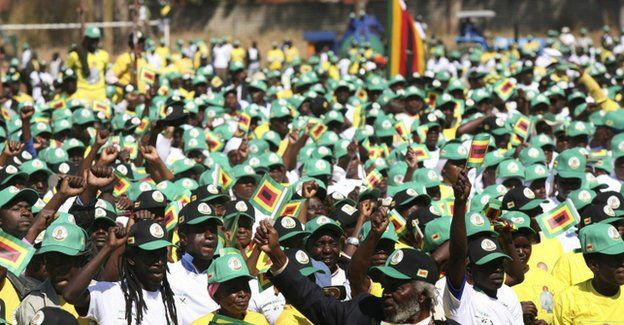
ZANU PF has been accused of fuelling conflict and hindering peace-building initiatives in rural communities that remain politically divided, socially fragmented and economically weak, according to a study by a local independent peace-building civil organisation.
BY NQOBANI NDLOVU
The study conducted by the Heal Zimbabwe Trust (HZT) titled “Peace building, Understanding Emerging Conflict Trends within Rural Districts of Zimbabwe”, blames Zanu PF for the land and partisan food distribution conflicts in rural communities.
The study was conducted between January and March 2015 from 27 rural districts in six provinces — Manicaland, Masvingo, the Midlands, Mashonaland East and Central, and Matabeleland North.
Zanu PF national spokesperson Simon Khaya Moyo could not be reached for comment yesterday.
The HZT said, through its study it sought to understand the conflict trends within local rural communities and how the obtaining power dynamics could be dealt with to create a peaceful Zimbabwe.
A minimum of two focus group discussions were held in each district with an average attendance of 15 to 20 participants per meeting. A total of 662 people participated in the study — 369 males and 293 females.
It involved 148 youths below 35 years of age while the rest were above the age of 35.
- Chamisa under fire over US$120K donation
- Mavhunga puts DeMbare into Chibuku quarterfinals
- Pension funds bet on Cabora Bassa oilfields
- Councils defy govt fire tender directive
Keep Reading
“The study observed that political labelling, partisan distribution of aid, land disputes, traditional leaders’ partisan conduct and general inequalities are the major trending conflicts in rural Zimbabwe. The most pronounced conflict trends are emerging from political labelling and unfair distribution of aid (particularly from the Presidential Agricultural Inputs Scheme),” HZT noted.
“The study revealed that power dynamics within rural communities are centred on political instrumentalisation of resources and issues.
“Elected officials, Zanu PF party leaders and traditional leaders were observed as the centres of power within surveyed local communities.
“Zanu PF leaders were identified as the most leading perpetrators of conflicts in the target communities while church leaders were ranked the most preferred to work with in peace-building and violence prevention.”
HZT said to deal with the growing challenges of political labelling as a social divider and conflict source in rural areas, there was need to deliberately raise awareness on the people’s political rights as espoused in Section 67 of the Constitution with a greater emphasis on political tolerance and diversity.
It added: “Political parties and their structures should be prevented from controlling the distribution of aid or resources meant for public benefit. The trusted government bureaucrats should implement the activities with the aid of traditional leaders.
“Civil society organisations and community peace-building structures should maximise their community mobilisation efforts on peace and integrate church and traditional leaders in their activities as acceptable institutions for community engagement and peace promotion.”










